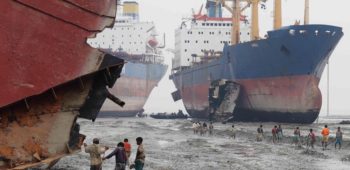
Out of 210 ships, which were broken in the second quarter of 2017, a total of 158 ended up on South Asian beaches for breaking, according to the latest report by NGO Shipbreaking Platform.
The worst dumping country this quarter was Germany with 16 beached ships, a consequence of the multiple bankruptcies “due to the toxic financing that has been characteristic of the German shipping industry.”
Other leading dumping nations were Singapore with 12 ships, Greece with 9, and South Korea with 8. Though 45 out of the 158 beached vessels this quarter were European-controlled, only four of these had a European flag.
Nearly a third of all the ships sent to South Asia this quarter changed flag to typical end-of-life registries, St Kitts & Nevis, Comoros, Palau, Djibouti, Niue and Togo, only weeks before hitting the beaches.
The worst company was the Singaporean Continental Shipping Line that had six Liberian-flagged vessels that all changed flag to St Kitts & Nevis or Comoros and were beached in South Asia. Quantum Pacific is a close runner-up on second place for worst dumping practices, with four ships sold to Pakistan and Bangladesh. Quantum has been under the Platform’s radar before as the worst dumper of 2015. The worst dumper of 2016 was UK-based Zodiac Maritime.
The Platform was able to document five accidents at the shipbreaking yards in Chittagong, Bangladesh, between April and June, which led to the death of four workers and the injury of two.
“The figures of this quarter not only show how legislation based on flag state jurisdiction will fail in changing the deplorable shipbreaking practices of the shipping industry, they also show that companies such as Quantum and Zodiac have no shame in continuing to exploit vulnerable workers in South Asia for the sake of extra profits,” according to NGO Shipbreaking Platform.
Copyright Ships & Ports Ltd. Permission to use quotations from this article is granted subject to appropriate credit given to www.shipsandports.com.ng as the source.
